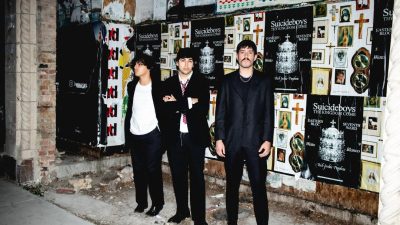Paa Kow’s jazz fusion life

by Jake Goldbas
Paa Kow’s high life is Cirque du Soleil for the ears. The music isn’t strictly divine, it didn’t come out of thin air. And yet its buoyancy gives it a heavenly aura. Ghanaian high life comes from its own indigenous roots in the country and still has influences from American jazz and later funk, reggae, and Afro-Cuban calypso. If you give it a chance, Paa Kow is a weird sort of candy for the ears.
The eponymous track from Paa Kow’s 2018 Cookpot, is a good introduction to the band. Paa Kow is the songwriter and bandleader, and the group’s drummer. His rhythm is an ordinary high life staple, similar to any number of 1980’s hits from Genesis, Phil Collins, or Peter Gabriel. Staccato bursts of horns punctuate Paa Kow’s Cookpot, maybe about a conversation with a favorite friend.
That’s when things get interesting. After establishing the beat and the horn verse, Paa Kow begins playing the melody on the drums. The rhythm fractures a kaleidoscope where each horn’s punctuation mark from earlier is articulated with its own corresponding drum, cymbal, or percussion block. The experience is a little bit queasy for someone accustomed to the regimented down strums of the Strokes or Interpol, and nothing is more mind-expanding than seeing Paa Kow nail down a trumpet solo note for note on the drums. The swinging high life beat does steady itself in the keyboards and the drums. The funk guitar bounces octaves like the Meters and then pushes up as if the conversation is about to go off of a ledge—the anxiety is a dance beat.
In this way, songs by Paa Kow and his band often take surprising turns because of this artistic virtuosity. Simple ideas and three-chord songs turn from straight pop into basically any form of music, like on Cookpot’s “Forced Landing,” which starts out as cool jazz and morphs into high life into faster funk fusion. Jazz’s combo traditional progression of soloing in order from the trumpet, to the piano, to bass, to drums, back to the hook is often tossed out the window naturally because drummer Paa Kow is the leader. Strong emphasis on an elaboration of melodies in jazz takes the backseat to call-and-answer improvised solos and pre-arranged melodies. Often, it’s hard to tell what is improvised on the spot, and what has been drilled into second nature, which is the point. Paa Kow’s live concert closer, “Dreams Come True,” adheres to a strict disco beat, with American gospel modulations and climbs on the keyboards. Paa Kow’s music often shows an authenticity in emotion American pop music lacks because emotions aren’t rigid technical conversations.
Paa Kow’s drum fills are what progressive indie rappers like Kendrick Lamar and Chance the rapper are doing, as in “To Pimp a Butterfly.” This is especially clear in “Meetu Ehum,” easily Paa Kow’s most accessible song from this record. In American indie rock, drum fills usually happen in between chords, and more often in between chord progressions, so they “fill” up the space. Fills make basic songs seem more full. Paa Kow’s fills ooze and drip in between chords, melodies, and progressions. Again, with dizzying mastery, Paa Kow never loses the beat.

In addition to the musical themes, Paa Kow’s work has deep roots in jazz aesthetics. Specifically, the fusion of Miles Davis because of its use of drums. According to legend, Miles Davis’s problem with piano player Oscar Peterson was Peterson organized rhythms from the piano instead of the drums. Davis thought drums represented jazz’s background in Africa. Paa Kow’s drums are the most important piece of any of his songs, and the instruments support the rhythm. More broadly, Paa Kow is from Africa, returning the favor from Davis.
African music, especially High Life, is making its way into popular consciousness, probably best exemplified by 2015’s top 40 hit “Cheerleader,” by OMI. Vampire Weekend continues to use African influences, as seen in its recent release in 2019. Separately, Paa Kow’s music has a common thread—and shared fan base–with jam bands like Dave Matthews Band, Phish, and the Grateful Dead. Dave Matthews cites his foundational childhood influence growing up in South Africa before moving to Virginia. Phish’s “Punch you in the Eye,” and DMB’s “Warehouse,” morph angry rock into salsa breaks, which wouldn’t be out of place in a Paa Kow song. Musically, this jam band background is partly because of Paa Kow’s improvisational manner, the surprising “anything goes” digressions, and because his compositions can last longer than many pop songs. Bela Fleck’s bass player Victor Wooten has said as much by playing with Paa Kow. And although they don’t sound alike, Paa Kow’s playbook was pioneered by jazz band Medeski, Martin, Scofield, and Wood, who are a jazz band on the jam circuit.













